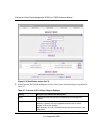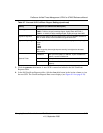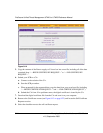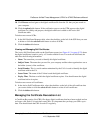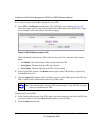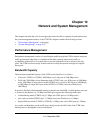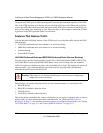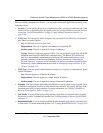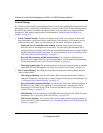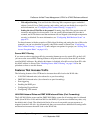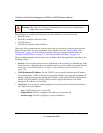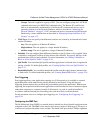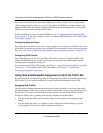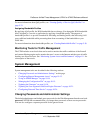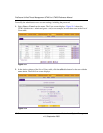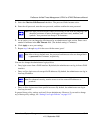
ProSecure Unified Threat Management UTM10 or UTM25 Reference Manual
10-4 Network and System Management
v1.0, September 2009
Content Filtering
If you want to reduce traffic by preventing undesired e-mails from reaching their destinations or by
preventing access to certain sites on the Internet, you can use the UTM’s content filtering feature.
By default, this feature is disabled; all requested traffic from any Web site is allowed with the
exception of Web content categories that are mentioned in “Default E-mail and Web Scan
Settings” on page 6-2.
• E-mail Content Filtering. To reduce incoming e-mail traffic, you can block e-mails with
large attachments, reject e-mails based on keywords, file extensions, or file names, and set
spam protection rules. There are several ways you can reduce undesired e-mail traffic:
– Setting the size of e-mail files to be scanned. Scanning large e-mail files requires
network resources and might slow down traffic. You can specify the maximum file or
message size that is scanned, and if files that exceed the maximum size are skipped (which
might compromise security) or blocked. For more information, see “Customizing E-mail
Anti-Virus and Notification Settings” on page 6-5.
– Keyword, file extension, and file name blocking. You can reject e-mails based on
keywords in the subject line, file type of the attachment, and file name of the attachment.
For more information, see “E-mail Content Filtering” on page 6-8.
– Protecting against spam. Set up spam protection to prevent spam from using up valuable
bandwidth. For more information, see “Protecting Against E-mail Spam” on page 6-11.
• Web Content Filtering. The UTM provides extensive methods to filtering Web content in
order to reduce traffic:
– Web category blocking. You can block entire Web categories because their content is
undesired, offensive, or not relevant, or simply to reduce traffic. For more information, see
“Configuring Web Content Filtering” on page 6-23.
– Keyword and file extension blocking. You can specify words that, should they appear in
the Web site name (URL), file extension, or newsgroup name, cause that site, file, or
newsgroup to be blocked by the UTM. For more information, see “Configuring Web
Content Filtering” on page 6-23.
– URL blocking. You can specify up to 200 URLs that are blocked by the UTM. For more
information, see “Configuring Web URL Filtering” on page 6-30.
– Web services blocking. You can block Web services such as instant messaging and peer-
to-peer services. For more information, see “Customizing Web Protocol Scan Settings and
Services” on page 6-19.



